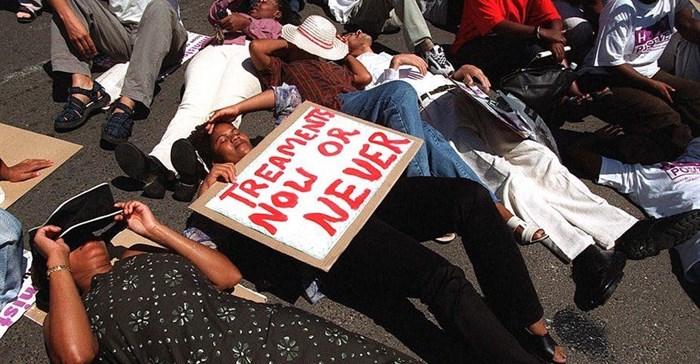
Aids activists lie down in protest in front of parliament in 2001 in Cape Town, South Africa.
Staging this complex conference in all time zones with fair distribution of prime-time events, live streaming and opportunities for real-time interactions was no small feat and inevitably there were a few technological glitches. But, overall, the exchange of ideas, experiences and solutions remained a strong priority throughout.
Several notable developments and breakthroughs were announced, highlighting the exciting advances being made in the fight to end HIV. As usual, the robust and vibrant global village underpinned the spirit of creativity and resilience – the theme of this year’s conference – and an enduring aspect of the 38-year-old Aids response.
Understandably, the impact of the Covid-19 pandemic on HIV services and research, and on healthcare outcomes generally, featured strongly. A special International Aids Society Covid-19 conference, free for the public to register, was convened. This delved into the latest from the Covid-19 global pandemic response.
But the Aids 2020 conference also strove to shift attention back to the importance of continuing HIV research and services despite the challenges brought about by Covid-19.
Just ahead of the conference a report was released which flagged how off-track the Aids response is from its 2020 targets. These targets were that by 2020, 90% of all people with HIV must know their status, 90% of those diagnosed with HIV must receive antiretroviral therapy, and 90% of people receiving antiretroviral therapy must be virally suppressed.
Read more:
HIV, AIDS and 90-90-90: what is it and why does it matter?
Nevertheless there was also news that showed just how far the world has come. For example, the field of pre-exposure prophylaxis is seeing astonishing developments, and an intriguing case of long-term remission without a bone marrow transplant brought renewed excitement to cure research.
A range of the science around HIV was also shared at the conference. Here are some highlights.
Treatment
HIV treatment really has come of age as we enter an era of single-tablet combination regimens and long-acting injectables. These treatments have far fewer side effects and are much simpler to take than the early days when the first conference was held decades ago.
But nothing is ever perfect. There was a great deal of talk at the conference about the phenomenon of weight gain highlighted by the outcomes of the South African Advance study. This clinical trial compared the integrase inhibitor antiviral agent known as dolutegravir when combined with the drugs tenofovir disoproxil fumarate (TDF) or its cousin tenofovir alafenamide (TAF) compared with an efavirenz-based regimen.
The 96-week data from the trial showed this to be an ongoing issue for women in particular. Some gained as much as 10kg. South Africa will soon switch its first line from an efavirenz based regimen to that of dolutegravir with tenofovir and lamivudine (known as TLD). This switch has been much welcomed by patients and clinicians with the promise of fewer side effects and better outcomes.
What this new development of weight gain means will need ongoing research and review to determine.
Prevention
The breakthrough news of the conference came from prevention research, with the latest trial results from a study known as HPTN 083. The trial found that a long-acting injection of cabotegravir was not inferior at preventing HIV infection than daily oral pills of tenofovir/emtricitabine for pre-exposure prophylaxis (PrEP). The study enrolled men and transgender women who have sex with men in over 40 sites around the world.
The Desmond Tutu HIV Centre Clinical Trials Unit at Groote Schuur Hospital in Cape Town is a participating research site, and the only African site, in the global trial, which overall enrolled 4,570 participants.
The regimen requires two shots of a large volume of antiretroviral (interestingly also an integrase inhibitor known as cabotegravir) into the buttocks. This has been found to provide good prevention cover for up to eight weeks without the need for daily pill taking.
This is exciting news for prevention, as the injection presents a long-acting, discreet alternative to the daily oral pill as PrEP.
A companion study, HPTN 084, is evaluating the same long-acting method in cisgender women in sub-Saharan Africa. Anticipated results from this study will provide insight as to whether this achievement in prevention can also benefit women in this region. Hopefully, the expanding prevention menu will enhance the efforts to reach the UNAIDS-prescribed prevention targets that were missed in this 2020 review.
Next steps
Some countries have reached the targets, including Eswatini. But the UNAIDS report showed also that treatment targets in many regions have been missed. This is a reminder that it’s a tall order to provide lifelong antiretroviral therapy to 38 million people living with HIV in a sustained way all over the world. This underscores why ongoing research into an HIV cure is warranted and important.
A highlight of the week was the report of a Brazilian patient who underwent relatively (by previous standards) simple therapy and has sustained an HIV-negative status following planned treatment interruption. Time and further investigations will tell whether this is sustained into the future.
At the present, there are only two other people who have had long-term virus-free survival, but both only after undergoing gruelling bone marrow transplantation and other therapies for concomitant cancer.
This article is republished from The Conversation under a Creative Commons license. Read the original article.














































